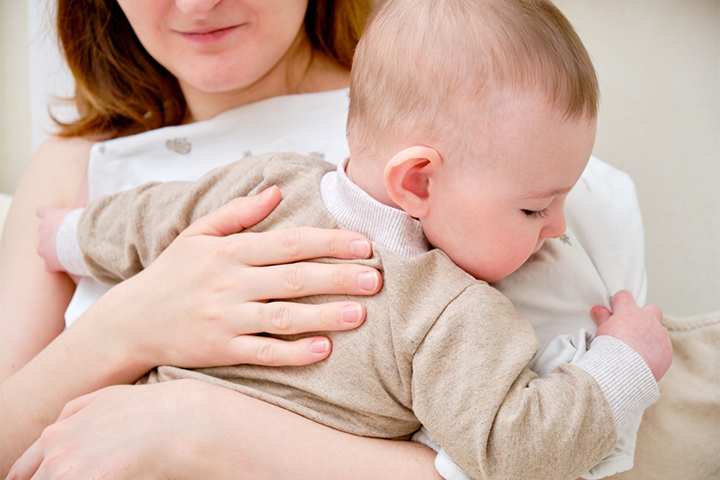
Image: Shutterstock
When you imagined your life with your little one, you probably pictured kissing the little toes, swaddling them, and clicking their angelic photos when they slept peacefully in their baby bassinet. But now that you have your little one in your arms and welcome them home, you already have too much going on in your mind that does not match the scenario of the heavenly things you pictured. Yes, now you have a bawling infant who feeds, poops, pees, and sleeps in cycles that are too quick for you to sync with. Many first-time parents experience anxiety and confusion during this period, but it doesn’t have to be that way. If you have the question ‘now what’ and want helpful tips on looking after your newborn, we are here to help. Read on to know them all.
1. Proper Sleeping Schedule
Image: Shutterstock
Your newborn will sleep for 16–17 hours a day, in short stretches, for the first two weeks (1). This is natural as their brain tries to get used to life outside the womb. This is when a baby’s sleep schedule often clashes with the parents. Establishing a consistent nap and bedtime routine for your infant is essential.
2. Wake Up Time
Image: Shutterstock
Babies learn to identify voices by hearing you talk to them. It’s a boon to language learning as well. The more exposure to language they get as infants, the more comfortable they will be when they begin experimenting with it on their own as toddlers. A baby’s cries are a form of communication, but it can be difficult for new parents to decipher the underlying cause of their child’s discomfort. As you and your baby grow closer, you’ll notice little differences in the infant’s screams. Depending on their needs, they may scream because they are hungry, weary, or want to be carried. Babies usually cry because they need something. If you’re having trouble pinpointing the problem, try the following:
- Are they hungry?
- Is there a stink coming from the diaper?
- Are they hurt?
- Are they feeling lonely?
- Are they exhausted?
Babies do several things during their waking time that are healthy and normal for their development. For example, a baby has little motor control. Therefore, their limbs sometimes produce jerky movements. Unexpected sounds, such as gurgling, sneezing, grunting, or squeaking, are expected. You can’t possibly spend every waking second watching your child’s every move. First, you should consider the significance of understanding your baby’s distinct non-verbal communication and indications.
3. Breastfeeding
Image: Shutterstock
If this is your first time nursing, you must learn how to increase your milk production and proper feeding practices. You should be prepared for emergencies such as a blocked milk duct or a difficult let-down. These are readily remedied but can be uncomfortable and stressful for you and the kid if you don’t recognize the symptoms in time. Babies have small stomachs. Thus the first few feedings may be brief. A newborn child should be fed every one to two hours for the first two weeks of their life, consuming between one and three ounces every feeding and every three to four ounces by two months old. However, infants have an innate sense of fullness and will often pull away from the bottle or breast when they’ve had enough to eat. In addition, they will require frequent burping.
4. Burping
Image: Shutterstock
When a baby takes in too much air while being fed, they burp. Babies can burp on their own, but many will require help. One can burp in a variety of ways. After practicing for a day or two, you’ll figure out the best postures. Here are some helpful hints for breastfeeding and burping:
Feeding may get messy, so have a towel handy in case of accidents. When a baby cries in the middle of a feeding, gas or bloating are usually to blame. However, you may try a little burping and see if it helps. When switching breasts when nursing, it’s essential to pause for a burp. However, the intensity of your burping is not required. Gentle pats will generally do the trick. Frequent vomiting is a sign of gastroesophageal reflux disease (GERD), which can cause acid to back up into the food pipe and cause stomach discomfort.
5. Diaper Changes
Image: Shutterstock
The hospital will provide instructions on how to change your baby’s diapers properly. To be safe, you should always check the diaper one hour after each meal. During the first month, a breastfed baby will require five diaper changes per day, whereas a formula-fed baby would require 10. Diaper rashes can occur if dirty diapers are kept on for too long. This crimson patch, which feels and looks like a sunburn, is located in the diaper area. Some infants have sensitive skin and are more likely to develop diaper rashes than others, but this is easily remedied with over-the-counter ointments.
Having a newborn in your house can feel stressful, especially when unsure what to do. A simple cry from your baby can make you run from corner to corner, figuring out what is causing your child distress. However, you must be very calm about your baby and seek help when necessary. So, what about the newborn baby you love the most? Let us know in the comments section!

















